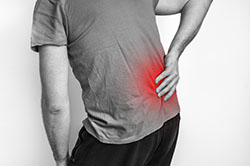HIP BURSITIS

Painful swelling of the bursae in the hip region is referred to as hip bursitis. The bursae are located in a few parts of the body. They are sacs filled with fluid that cushion the muscles, ligaments, and tendons.
When functioning properly, the bursae help these tendons, muscles, and ligaments flow over bones in the body. When they become swollen, the result is tenderness and pain in that area.
What are the causes of hip bursitis?
Hip bursitis occurs due to overuse or stress in the area, rheumatoid arthritis, gout, hip injuries, infections, diabetes, spinal issues, uneven length of the legs and bone spurs. Athletes are prone to the condition, as they engage in activities that often stress the hip area and cause sports injuries.
What are the symptoms of hip bursitis?
The most common symptoms related to hip bursitis include joint pain and severe tenderness. The patient may experience swelling in the area. They may also find the area very warm. The pain associated with bursitis is often very sharp in the beginning. It begins to dull a few days later. It is most noticeable when performing specific actions, such as getting out of bed or sitting down.
There are two types of bursitis – acute and chronic. Acute bursitis will last for a few hours or days. Chronic bursitis is present for days to weeks. It can even go away and resurface in the future. Acute bursitis often becomes chronic if it is not properly treated.
What is the treatment for hip bursitis?
The best course of treatment will include a lot of rest, anti-inflammatory drugs and specific exercises to help build up the strength in the region. Some patients have fluid removed from their bursa to ease the swelling and pain.
Patients who are suffering from pain or tenderness in their hip region should seek advice from a sports medicine specialist immediately. By contacting a sports medicine doctor at the Spinal Rehab Sports Medicine clinic, you are giving yourself the best chance of a full recovery. Dr. Bob can diagnose the condition and recommend a course of sports injury treatment.